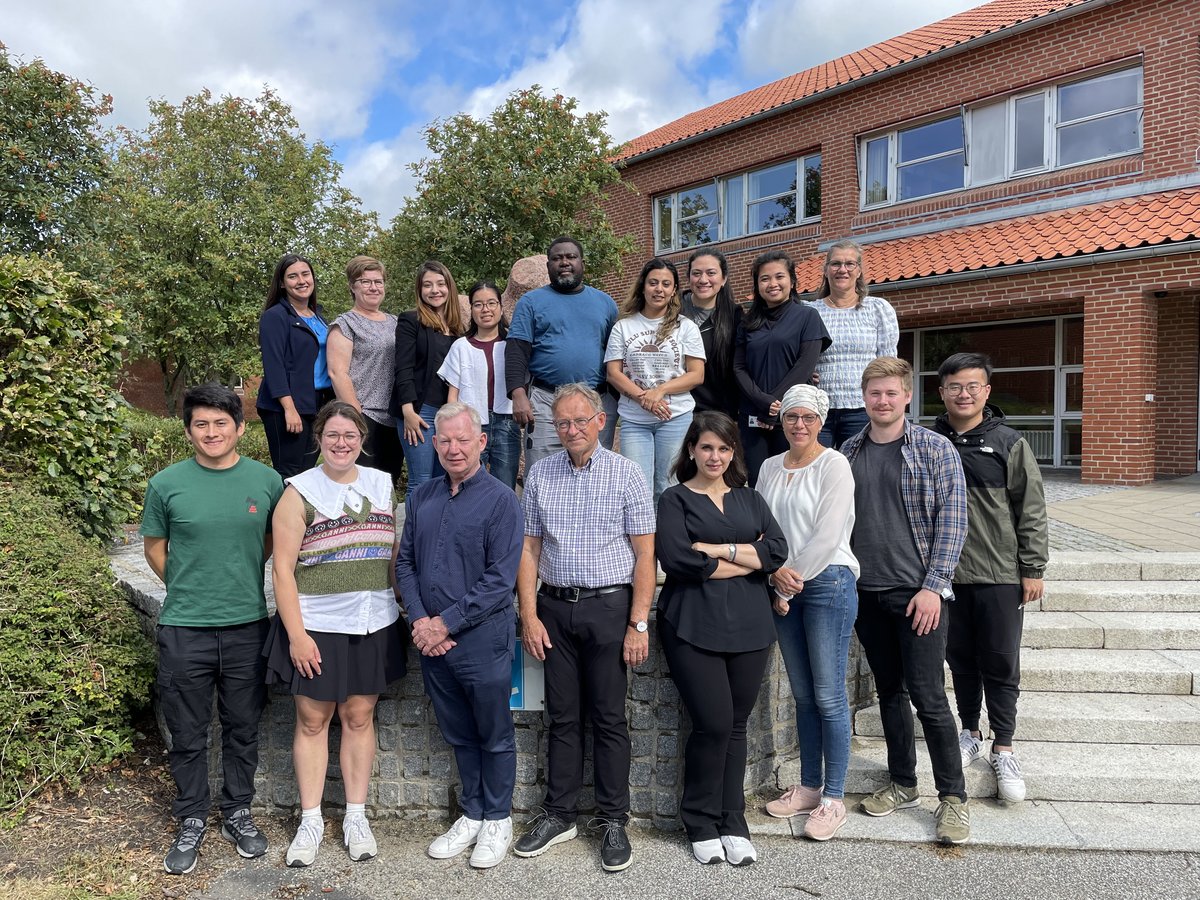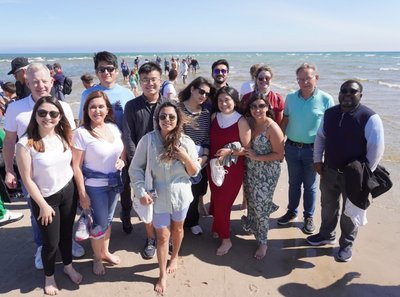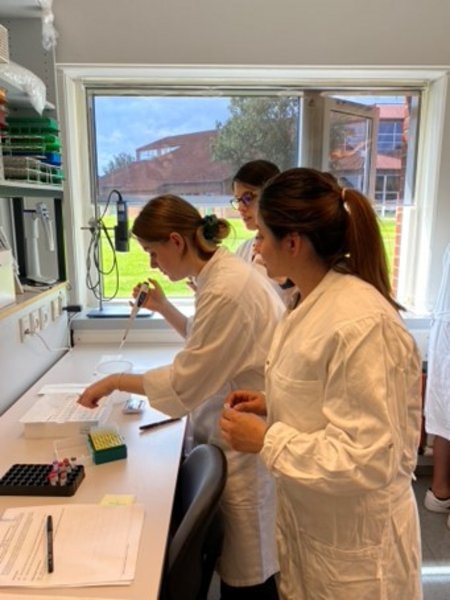Highlights from PhD Course - Carbohydrates: Nutrition and Intestinal Health of Non-Ruminant Animals
By Elisabeth Chassé, Li-Hsuan Chen and Ulia Renfelia Baysi
In August, Professor Knud Erik Bach Knudsen, core researcher in the PIG-PARADIGM Nutrition Pillar and the section manager in the Department of Animal and Veterinary Sciences at Aarhus University, hosted a comprehensive 2-week PhD course entitled "Carbohydrates with Emphasis on Nutrition and Intestinal Health of Non-Ruminant Animals." at AU Viborg.
A number of PIG-PARADIGM researchers and PhD students participated this course. Now, let's delve into the course details and gain insights into the participants' experiences.
This course aimed to provide participants with a comprehensive overview of the carbohydrates in feeds in relation to nutrition and intestinal health of non-ruminant animals. Many lecturers were invited to share on their expertise with diverse aspects of related to carbohydrates such as composition in feedstuff, digestion and absorption and gut health.
Here's a breakdown of the topics covered by the lecturers:
- Professor Knud Erik Bach Knudsen discussed about definitions and characterization of carbohydrates, wet chemical methods to analyze carbohydrates, composition in carbohydrates of cereals and legumes and quantitative aspects of carbohydrates digestion and absorption.
- Professor Han H. Stein from the University of Illinois shared about digestion, absorption and metabolism of carbohydrates and the use of animal models to study digestion.
- Helle N. Lærke, core researcher in the PIG-PARADIGM Nutrition Pillar and Senior Researcher in the Department of Animal and Veterinary Sciences at Aarhus University, talked about the use of animal and in vitro models, wet chemistry methods to analyze carbohydrates and viscosity measurement.
- PIG-PARADIGM Postdoc Élisabeth Chassé from Aarhus University discussed carbohydrates content in novel feedstuffs and the use of animal and in vitro models to study digestion.
- Researcher Samantha Joan Noel from Aarhus University talked about non-destructive methods for analysis of carbohydrates using near infrared spectroscopy and gave a demonstration of the analysis.
- Professor Birger Svihus from the Norwegian University of Life Sciences gave a talk about feed processing and how it can affect the properties and digestibility of carbohydrates.
- Nuria Canibe, Research Theme Lead in the PIG-PARADIGM Nutrition Pillar and a Senior Researcher in the Department of Animal and Veterinary Sciences at Aarhus University, shared the influence of carbohydrates and feed processing on microbial ecology and gut health.
- Postdoc Mihai-Victor Curtasu from Aarhus University discussed about metabolomics as a tool in carbohydrates metabolism.
In addition to the lectures, the course incorporated hands-on activities in the lab to learn about analyses related to carbohydrates (sugars, starch, non-starch polysaccharides and water-binding capacity). These activities allowed the students to develop lab skills and to practice calculation for results.
As most of the students were from abroad, the course included cultural excursions to explore Denmark and its popular landmarks, including Skagen, Rubjerg Knude Fyr, and Blokkhus during the weekend. Another tour to Hamlet Protein was also organized to gain insights into research and product development in the industry sector. Finally, a social dinner in Aarhus provided a platform for networking and socializing among participants.
Let's hear from two PIG-PARADIGM PhD students about their experience regarding this course:
Li-Hsuan
Carbohydrates serve as the main source of energy in pig diets. My research background is mainly in microbiology and immunology, so I have limited experience in the field of nutrition. This is why I was interested to take this course. Additionally, for my project in PIG-PARADIGM, I will be examining how different dietary protein levels in feed affect pig gut health and metabolite composition, which falls under nutritional science.
Throughout the course, there were numerous topics I found interesting and useful, including "Metabolism of Carbohydrates" and "Metabolomics as a Tool in Carbohydrate Metabolism." They both are relevant for my future studies. I learned that “Nutrient Metabolism” is a complicated system. Not only the host digestion itself but also the gut microbiota digestion or fermentation contribute to this carbohydrate metabolism and end up with different host and microbial-derived metabolite compositions that stimulate the energy balance and health status of the pig. These concepts and mechanism are probably similar to what I will find in my future research related to protein digestion and fermentation in the digestive system.
In summary, I have gained valuable insights from this course and believe it will greatly benefit my future studies.
Ulia
I recently embarked on a captivating two-week course focused on carbohydrates with emphasis on nutrition and intestinal health of non-ruminant animals.
The course began by defining and characterizing carbohydrates, providing a solid foundation for our exploration. From there, we explored their role in non-ruminant animal diets, including absorption, digestion, and metabolism. The course also delved into carbohydrates-gut microbiota interaction and their critical role in maintaining a healthy gut - emphasizing the importance of a balanced ecosystem for animal well-being. Another highlight of the course was the hands-on training, where we learned analytical methods and calculations for carbohydrate characterization in feed and digesta.
I learned how different types of carbohydrate, particle sizes, and processing techniques affect digestion and gut health. Furthermore, we were introduced to metabolomics as a powerful tool for analyzing metabolism, offering relevance to my future research in the PIG-PARADIGM project.
Beyond the classroom, we explored Aarhus University Viborg campus and the city of Aarhus and engaged with course participants from academia and industry. A visit to Hamlet Protein, a company specializing in soy-based specialty ingredients, provided practical insights into the industry's application of nutrition research.
The course concluded with engaging case studies on diets with varying carbohydrate contents, allowing us to apply our knowledge in practical scenarios. In retrospect, this course was both enlightening and enriching. I'm grateful for the opportunity to learn from experts in the field and connect with fellow enthusiasts.





